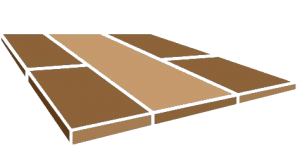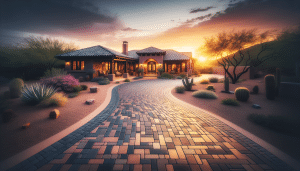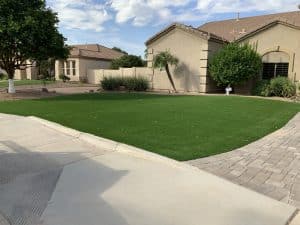Creating the perfect poolside oasis starts with choosing the right materials for your pool deck. It’s not just about aesthetics; it’s also about safety, durability, and maintenance. At Gilbert Paver Company, we understand the importance of selecting the ideal pool deck material. In this comprehensive guide, we’ll explore various pool deck materials, helping you make an informed decision that enhances both the beauty and functionality of your pool area.
Your pool deck is not just a functional space; it’s an integral part of your outdoor living area. The choice of pool deck material greatly influences the overall aesthetics and usability of the space. This guide will help you explore the options and make an informed decision for your poolside paradise.
Contents
Concrete Pool Decks
Pros:
- Durability: Concrete pool decks can withstand heavy foot traffic and pool chemicals.
- Customization: They can be stamped, colored, or textured for various design possibilities.
- Cost-Effective: Concrete is often more budget-friendly than other materials.
Cons:
- Heat Retention: Concrete can get hot in direct sunlight.
- Cracking: Over time, concrete may develop cracks that require repair.
- Sealing Required: Regular sealing is necessary to maintain appearance and durability.
Ideal Uses: Suitable for pool areas seeking customization and durability.
Brick Pool Decks
Pros:
- Classic Aesthetics: Bricks offer timeless charm and visual appeal.
- Durability: With proper maintenance, brick pool decks can last for decades.
- Low Maintenance: They require minimal upkeep once installed.
Cons:
- Cost: Initial cost may be higher than concrete.
- Uneven Surface: Brick pool decks can develop an uneven surface over time.
- Limited Color Choices: Fewer color options compared to concrete or natural stone.
Ideal Uses: Ideal for pool areas where a classic, traditional look is desired.
Natural Stone Pool Decks
Pros:
- Luxurious Appearance: Natural stone pool decks offer a high-end, luxurious look.
- Durability: Many types of natural stone are incredibly durable.
- Low Heat Absorption: Natural stone tends to stay cooler in the sun.
Cons:
- Cost: Often the most expensive option.
- Sealing Required: Regular sealing may be needed to protect the stone’s appearance.
- Limited Color Choices: Limited color options compared to concrete.
Ideal Uses: Perfect for upscale pool areas aiming for a luxurious aesthetic.
Factors to Consider
When selecting a pool deck material, consider factors such as your budget, desired aesthetics, climate, and maintenance preferences. The specific needs of your pool area will help determine the best material for your project.
Making Your Decision
The choice of pool deck material should align with your vision for the perfect poolside retreat. Gilbert Paver Company can provide expert guidance to ensure your selection meets your unique requirements, ensuring your pool deck is not only stunning but also functional and safe.
FAQs – Your Top Questions Answered
Which pool deck material provides the best slip resistance?
Natural stone pool decks tend to offer excellent slip resistance due to their texture.
What material requires the least maintenance?
Concrete pool decks are typically lower maintenance, but all materials require some level of care.
Which option offers the most design versatility?
Concrete allows for the greatest design versatility with various colors, textures, and patterns.
How do climate and location affect the choice of pool deck material?
Hotter climates may favor materials that stay cooler, like natural stone. Location near the ocean may require materials that resist saltwater corrosion.
Can pool deck materials be combined for a unique look?
Yes, combining materials creatively can result in a unique and visually appealing pool deck design.
Ready to transform your pool area into a beautiful and functional space? Contact Gilbert Paver Company for expert guidance and a personalized quote. Let’s create the perfect pool deck for your outdoor oasis.




